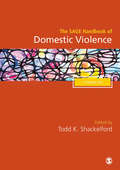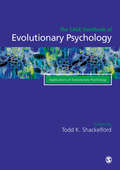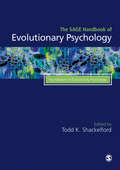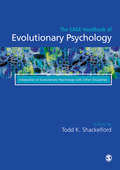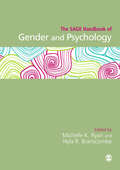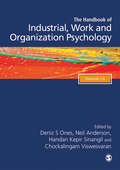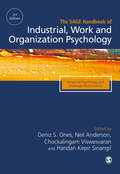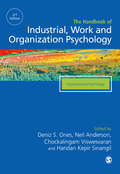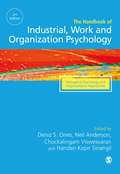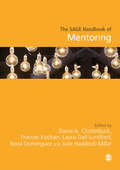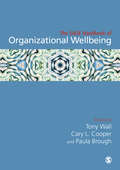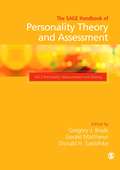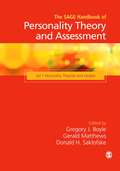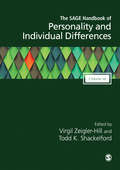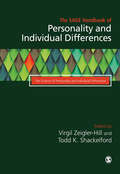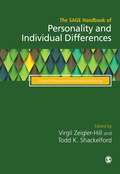- Table View
- List View
The SAGE Handbook of Domestic Violence
by Todd K. ShackelfordThe field of Domestic Violence research has expanded considerably in the past decade and now includes work conducted by researchers in many different disciplines, notably political science, public health, law, psychology, sociology, criminology, anthropology, family studies, and medicine. The SAGE Handbook of Domestic Violence provides a rich overview of the most important theoretical and empirical work in the field, organized by relationship type. The handbook addresses three major areas of research on domestic violence: - Violence against partners - Violence against children - Violence against other family members. This Handbook is a unique and timely publication and a long awaited, valuable resource for the vast amount of Domestic Violence research centres and individual researchers across the globe.
The SAGE Handbook of Evolutionary Psychology: Applications of Evolutionary Psychology
by Todd K. ShackelfordEvolutionary psychology is an important and rapidly expanding area in the life, social, and behavioral sciences, and this Handbook represents the most comprehensive and up-to-date reference text in the field today. Chapters in this Handbook address real-world and practical applications of evolutionary psychology such as applications to medicine, psychiatry, law, and technology. The SAGE Handbook of Evolutionary Psychology is an essential resource for researchers, graduate students, and advanced undergraduate students in all areas of psychology, and in related disciplines across the life, social, and behavioral sciences. Part 1: Applications to Health and Well-Being Part 2: Applications to Law and Order Part 3: Applications to Technology, Communications, and the Future
The SAGE Handbook of Evolutionary Psychology: Applications of Evolutionary Psychology
by Todd K. ShackelfordEvolutionary psychology is an important and rapidly expanding area in the life, social, and behavioral sciences, and this Handbook represents the most comprehensive and up-to-date reference text in the field today. Chapters in this Handbook address real-world and practical applications of evolutionary psychology such as applications to medicine, psychiatry, law, and technology. The SAGE Handbook of Evolutionary Psychology is an essential resource for researchers, graduate students, and advanced undergraduate students in all areas of psychology, and in related disciplines across the life, social, and behavioral sciences. Part 1: Applications to Health and Well-Being Part 2: Applications to Law and Order Part 3: Applications to Technology, Communications, and the Future
The SAGE Handbook of Evolutionary Psychology: Foundations of Evolutionary Psychology
by Todd K. ShackelfordEvolutionary psychology is an important and rapidly expanding area in the life, social, and behavioral sciences, and this Handbook represents the most comprehensive and up-to-date reference text in the field today. Chapters in this Handbook address foundational theories and methodological approaches, providing a rich overview of the most important theoretical and empirical work in the field. The SAGE Handbook of Evolutionary Psychology is an essential resource for researchers, graduate students, and advanced undergraduate students in all areas of psychology, and in related disciplines across the life, social, and behavioral sciences. Part 1: Foundations of Evolution Part 2: Middle-Level Evolutionary Theories Part 3: Research Methods and Strategies
The SAGE Handbook of Evolutionary Psychology: Foundations of Evolutionary Psychology
by Todd K. ShackelfordEvolutionary psychology is an important and rapidly expanding area in the life, social, and behavioral sciences, and this Handbook represents the most comprehensive and up-to-date reference text in the field today. Chapters in this Handbook address foundational theories and methodological approaches, providing a rich overview of the most important theoretical and empirical work in the field. The SAGE Handbook of Evolutionary Psychology is an essential resource for researchers, graduate students, and advanced undergraduate students in all areas of psychology, and in related disciplines across the life, social, and behavioral sciences. Part 1: Foundations of Evolution Part 2: Middle-Level Evolutionary Theories Part 3: Research Methods and Strategies
The SAGE Handbook of Evolutionary Psychology: Integration of Evolutionary Psychology with Other Disciplines
by Todd K. ShackelfordEvolutionary psychology is an important and rapidly expanding area in the life, social, and behavioral sciences, and this Handbook represents the most comprehensive and up-to-date reference text in the field today. Chapters in this Handbook address theory and research that integrates evolutionary psychology with other life, social, and behavioral sciences, as well as with the humanities. The SAGE Handbook of Evolutionary Psychology is an essential resource for researchers, graduate students, and advanced undergraduate students in all areas of psychology, and in related disciplines across the life, social, and behavioral sciences. Part 1: Integration within Psychology Part 2: Integration with other Life, Social, and Behavioral Sciences Part 3: Integration with the Humanities
The SAGE Handbook of Evolutionary Psychology: Integration of Evolutionary Psychology with Other Disciplines
by Todd K. ShackelfordEvolutionary psychology is an important and rapidly expanding area in the life, social, and behavioral sciences, and this Handbook represents the most comprehensive and up-to-date reference text in the field today. Chapters in this Handbook address theory and research that integrates evolutionary psychology with other life, social, and behavioral sciences, as well as with the humanities. The SAGE Handbook of Evolutionary Psychology is an essential resource for researchers, graduate students, and advanced undergraduate students in all areas of psychology, and in related disciplines across the life, social, and behavioral sciences. Part 1: Integration within Psychology Part 2: Integration with other Life, Social, and Behavioral Sciences Part 3: Integration with the Humanities
The SAGE Handbook of Gender and Psychology
by Nyla R Branscombe Michelle K. RyanThe SAGE Handbook of Gender and Psychology is a unique, state-of-the-art synthesis of the known work, combined with current research trends, in the broad field of gender and psychology. In the past 35 years academic publications on the subject have increased tenfold, and this level of activity as well the diversity of research looks set to increase in the coming years too. The time is ideal for a systematic review of the field. Contributions come from academics around the world and many different disciplines, and as a result multiple perspectives and a diversity of methodologies are presented to understand gender and its implications for behaviour. Chapters cover a wide variety of topics, theoretical approaches, contexts, and social issues; they also critically examine the key issues and current debates. Both advanced students and scholars will find extensive range and depth in the topics covered across the Handbook's 29 chapters. Published as a single volume, the handbook is aimed at individuals as well as the library market. The SAGE Handbook of Gender and Psychology will have mass appeal across the field of psychology, including social psychology and gender and psychology, as well a number of other subject groups such as gender studies, sociology, organizational behaviour and political science.
The SAGE Handbook of Industrial, Work & Organizational Psychology, 3v: Personnel Psychology and Employee Performance; Organizational Psychology; Managerial Psychology and Organizational Approaches
by Deniz S. Ones Neil Anderson Handan Kepir Sinangil Chockalingam ViswesvaranThe second edition of this best-selling Handbook presents a fully updated and expanded overview of research, providing the latest perspectives on the analysis of theories, techniques, and methods used by industrial, work, and organizational psychologists. Building on the strengths of the first edition, key additions to this edition include in-depth historical chapter overviews of professional contexts across the globe, along with new chapters on strategic human resource management; corporate social responsibility; diversity, stress, emotions and mindfulness in the workplace; environmental sustainability at work; aging workforces, among many others. Providing a truly global approach and authoritative overview, this three-volume Handbook is an indispensable resource and essential reading for professionals, researchers and students in the field. Volume One: Personnel Psychology and Employee Performance Volume Two: Organizational Psychology Volume Three: Managerial Psychology and Organizational Approaches
The SAGE Handbook of Industrial, Work & Organizational Psychology: V1: Personnel Psychology and Employee Performance
by Neil Anderson Deniz S Ones Dr Chockalingam Viswesvaran Handan Kepir SinangilThe first volume in The SAGE Handbook of Industrial, Organizational and Work Psychology introduces key concepts in personnel and employee performance from cognitive ability and the psychological predictors used in assessments to employee and team values. The editor and contributors present a clear overview of key research in the areas of behaviour change and how to assess individual job performance – making Volume I indispensable for anyone working in or studying Human Resource Management.
The SAGE Handbook of Industrial, Work & Organizational Psychology: V1: Personnel Psychology and Employee Performance
by Neil Anderson Deniz S Ones Dr Chockalingam Viswesvaran Handan Kepir SinangilThe first volume in The SAGE Handbook of Industrial, Organizational and Work Psychology introduces key concepts in personnel and employee performance from cognitive ability and the psychological predictors used in assessments to employee and team values. The editor and contributors present a clear overview of key research in the areas of behaviour change and how to assess individual job performance – making Volume I indispensable for anyone working in or studying Human Resource Management.
The SAGE Handbook of Industrial, Work & Organizational Psychology: V2: Organizational Psychology
by Neil Anderson Deniz S Ones Dr Chockalingam Viswesvaran Handan Kepir SinangilThe second volume in the SAGE Handbook of Industrial, Organizational and Work Psychology looks in detail at how teams and individuals function and perform. It covers motivation and organizational socialisation as well as the latest research into diversity and organizational culture in the workplace. There are also sections on social networks and how job loss and the experience of unemployment can affect individuals and wider groups within organizations. Part One: Lenses Part Two: Social and Political Order Part Three: Legacies Part Four: Problems and Problematics
The SAGE Handbook of Industrial, Work & Organizational Psychology: V2: Organizational Psychology
by Neil Anderson Deniz S Ones Dr Chockalingam Viswesvaran Handan Kepir SinangilThe second volume in the SAGE Handbook of Industrial, Organizational and Work Psychology looks in detail at how teams and individuals function and perform. It covers motivation and organizational socialisation as well as the latest research into diversity and organizational culture in the workplace. There are also sections on social networks and how job loss and the experience of unemployment can affect individuals and wider groups within organizations. Part One: Lenses Part Two: Social and Political Order Part Three: Legacies Part Four: Problems and Problematics
The SAGE Handbook of Industrial, Work & Organizational Psychology: V3: Managerial Psychology and Organizational Approaches
by Neil Anderson Deniz S Ones Dr Chockalingam Viswesvaran Handan Kepir SinangilThe third volume in The SAGE Handbook of Industrial, Organizational and Work Psychology concentrates on business decision-making and the many factors influencing the adoption and implementation of IWO practices. Chapter topics include utility assessments of interventions, decision-making errors in IWO systems, large-scale interventions and best practices reviews. Volume Three offers a comprehensive overview of the field for anyone working in or studying managerial or organizational psychology.
The SAGE Handbook of Industrial, Work & Organizational Psychology: V3: Managerial Psychology and Organizational Approaches
by Neil Anderson Deniz S Ones Dr Chockalingam Viswesvaran Handan Kepir SinangilThe third volume in The SAGE Handbook of Industrial, Organizational and Work Psychology concentrates on business decision-making and the many factors influencing the adoption and implementation of IWO practices. Chapter topics include utility assessments of interventions, decision-making errors in IWO systems, large-scale interventions and best practices reviews. Volume Three offers a comprehensive overview of the field for anyone working in or studying managerial or organizational psychology.
The SAGE Handbook of Mentoring
by Dr Frances Kochan Dr Julie Haddock-Millar Dr Laura Gail Lunsford Dr Nora Dominguez Professor David Ashley ClutterbuckThe SAGE Handbook of Mentoring provides a scholarly, comprehensive and critical overview of mentoring theory, research and practice across the world. Internationally renowned authors map out the key historical and contemporary research, before considering modern case study examples and future directions for the field. The chapters are organised into four areas: The Landscape of Mentoring The Practice of Mentoring The Context of Mentoring Case Studies of Mentoring Around the Globe This Handbook is a resource for mentoring academics, students and practitioners across a range of disciplines including business and management, education, health, psychology, counselling, and social work.
The SAGE Handbook of Mentoring
by Dr Frances Kochan Dr Julie Haddock-Millar Dr Laura Gail Lunsford Dr Nora Dominguez Professor David Ashley ClutterbuckThe SAGE Handbook of Mentoring provides a scholarly, comprehensive and critical overview of mentoring theory, research and practice across the world. Internationally renowned authors map out the key historical and contemporary research, before considering modern case study examples and future directions for the field. The chapters are organised into four areas: The Landscape of Mentoring The Practice of Mentoring The Context of Mentoring Case Studies of Mentoring Around the Globe This Handbook is a resource for mentoring academics, students and practitioners across a range of disciplines including business and management, education, health, psychology, counselling, and social work.
The SAGE Handbook of Organizational Wellbeing
by Cary L. Cooper Tony Wall Paula BroughThe SAGE Handbook of Organizational Wellbeing is a comprehensive and cutting-edge work providing the latest insights into a range of perspectives on organizational wellbeing, as well as highlighting global wellbeing issues and exploring new contexts. Topics covered include: digital working and social media, LGBTQIA+ identifications and work, suicide at work, refugee workers, and mental health. A multi- and inter-disciplinary work, this handbook embraces ideas and empirical work from a range of fields including psychology, business and management, economics, and science. This handbook draws together current knowledge whilst also outlining emerging issues and directions, making this an invaluable resource for students and researchers spanning a wide array of disciplines. Part 1: Theoretical Perspectives Part 2: International Issues and Contexts Part 3: Developing Organizational Wellbeing Part 4: Emerging Issues and Directions
The SAGE Handbook of Organizational Wellbeing
by Cary L. Cooper Tony Wall Paula BroughThe SAGE Handbook of Organizational Wellbeing is a comprehensive and cutting-edge work providing the latest insights into a range of perspectives on organizational wellbeing, as well as highlighting global wellbeing issues and exploring new contexts. Topics covered include: digital working and social media, LGBTQIA+ identifications and work, suicide at work, refugee workers, and mental health. A multi- and inter-disciplinary work, this handbook embraces ideas and empirical work from a range of fields including psychology, business and management, economics, and science. This handbook draws together current knowledge whilst also outlining emerging issues and directions, making this an invaluable resource for students and researchers spanning a wide array of disciplines. Part 1: Theoretical Perspectives Part 2: International Issues and Contexts Part 3: Developing Organizational Wellbeing Part 4: Emerging Issues and Directions
The SAGE Handbook of Personality Theory and Assessment: Personality Measurement and Testing (Volume 2) (Volume #2)
by Gerald Matthews Professor Gregory J Boyle Dr Donald H SaklofskeA definitive, authoritative and up-to-date resource for anyone interested in the theories, models and assessment methods used for understanding the many factes of Human personality and individual differences This brand new Handbook of Personality Theory and Assessment 2-Volume Set constitutes an essential resource for shaping the future of the scientific foundation of personality research, measurement, and practice. There is need for an up-to-date and international Handbook that reviews the major contemporary personality models Vol. 1 and associated psychometric measurement instruments Vol. 2 that underpin the scientific study of this important area of individual differences psychology, and in these two Handbooks this is very much achieved. Made unique by its depth and breadth the Handbooks are internationally edited and authored by Professors Gregory J. Boyle, Gerald Matthews, and Donald H. Saklofske and authored by internationally known academics, this work will be an important reference work for a host of researchers and practitioners in the fields of individual differences and personality assessment, clinical psychology, educational psychology, work and organizational psychology, health psychology and other applied fields as well. Volume 2: Personality Measurement and Assessment. Covers psychometric measurement of personality and has coverage of the following broad topics, listed by section heading: " General Methodological Issues " Multidimensional Personality Instruments " Assessment of Biologically-Based Traits " Assessment of Self-Regulative Traits " Implicit, Projective And Objective Measures Of Personality " Abnormal Personality Trait Instruments " Applications of Psychological Testing
The SAGE Handbook of Personality Theory and Assessment: Personality Theories and Models (Volume 1) (Volume #1)
by Gerald Matthews Professor Gregory J Boyle Dr Donald H SaklofskeThis Handbook of Personality Theory and Assessment 2-Volume Set constitutes an essential resource for shaping the future of the scientific foundation of personality research, measurement, and practice. It reviews the major contemporary personality models (Volume 1) and associated psychometric measurement instruments (Volume 2) that underpin the scientific study of this important area of psychology. With contributions from internationally renowned academics, this work will be an important reference work for a host of researchers and practitioners in the fields of individual differences and personality assessment, clinical psychology, educational psychology, work and organizational psychology, health psychology and other applied fields as well. Volume 1: Personality Theories and Models. Deals with the major theoretical models underlying personality instruments and covers the following broad topics, listed by section heading: " Explanatory Models For Personality " Comprehensive Trait Models " Key Traits: Psychobiology " Key Traits: Self-Regulation And Stress " New Trait And Dynamic Trait Constructs " Applications
The SAGE Handbook of Personality and Individual Differences
by Todd K. Shackelford Virgil Zeigler-HillThe examination of personality and individual differences is a major field of research in the modern discipline of psychology. Concerned with the ways humans develop an organised set of characteristics to shape themselves and the world around them, it is a study of how people come to be ‘different’ and ‘similar’ to others, on both an individual and a cultural level. The SAGE Handbook of Personality and Individual Difference is the broadest and most comprehensive overview of the field to date. With outstanding contributions from leading scholars across the world, this is an invaluable resource for researchers and graduate students. Its three volumes cover all of the central concepts, domains and debates of this globally-expanding discipline, including the core theoretical perspectives, research strategies, as well as the origins, applications, and measurement of personality and individual difference.
The SAGE Handbook of Personality and Individual Differences: Volume I: The Science of Personality and Individual Differences
by Virgil Zeigler-Hill Dr Todd K. ShackelfordThe examination of personality and individual differences is a major field of research in the modern discipline of psychology. Concerned with the ways humans develop an organised set of characteristics to shape themselves and the world around them, it is a study of how people come to be ‘different' and ‘similar' to others, on both an individual and a cultural level. This volume explores the scientific foundations of personality and individual differences, in chapters arranged across three thematic sections: Part 1: Theoretical Perspectives on Personality and Individual Differences Part 2: Research Strategies for Studying Personality and Individual Differences Part 3: The Measurement of Personality and Individual Differences With outstanding contributions from leading scholars across the world, this is an invaluable resource for researchers and graduate students.
The SAGE Handbook of Personality and Individual Differences: Volume I: The Science of Personality and Individual Differences
by Virgil Zeigler-Hill Dr Todd K. ShackelfordThe examination of personality and individual differences is a major field of research in the modern discipline of psychology. Concerned with the ways humans develop an organised set of characteristics to shape themselves and the world around them, it is a study of how people come to be ‘different' and ‘similar' to others, on both an individual and a cultural level. This volume explores the scientific foundations of personality and individual differences, in chapters arranged across three thematic sections: Part 1: Theoretical Perspectives on Personality and Individual Differences Part 2: Research Strategies for Studying Personality and Individual Differences Part 3: The Measurement of Personality and Individual Differences With outstanding contributions from leading scholars across the world, this is an invaluable resource for researchers and graduate students.
The SAGE Handbook of Personality and Individual Differences: Volume II: Origins of Personality and Individual Differences
by Virgil Zeigler-Hill Dr Todd K. ShackelfordThe examination of personality and individual differences is a major field of research in the modern discipline of psychology. Concerned with the ways humans develop an organised set of characteristics to shape themselves and the world around them, it is a study of how people come to be ‘different' and ‘similar' to others, on both an individual and a cultural level. This volume focuses on the multiple origins of personality and individual differences, in chapters arranged across three thematic sections: Part 1: Biological Origins of Personality and Individual Differences Part 2: Developmental Origins of Personality and Individual Differences Part 3: Environmental Origins of Personality and Individual Differences With outstanding contributions from leading scholars across the world, this is an invaluable resource for researchers and graduate students.
